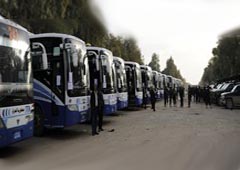WASHINGTON // Hundreds of members of an Iranian opposition militant group exiled in Iraq defied yesterday’s deadline to vacate their camp, a move that may jeopardise the group’s removal from a US terror list.
Nearly 2,000 members of MEK have relocated from the land they were granted by Saddam Hussein in 1986 at Camp Ashraf in north-west Iraq to Camp Hurriya, a former US military base on the outskirts of Baghdad.
About 1,300 resisted the deadline set by an Iraqi government eager to improve relations with Iran. Tehran wants Ashraf closed: under Saddam Hussein, the MEK conducted military operations from there across the border. The group has also been implicated in the recent assassinations of Iranian scientists
The MEK members who are holding out say conditions at Camp Hurriya are inhumane and refuse to be relocated. But Iraq’s government, the United Nations and the US State Department say the claims are just stalling tactics.
This month, Daniel Benjamin, the US State Department’s Coordinator for Counterterrorism, urged the group to cooperate.
"It is past time for the MEK to recognise that Ashraf is not going to remain an MEK base in Iraq," Mr Benjamin told reporters during a briefing on July 6.
"The Iraqi government is committed to closing it, and any plan to wait out the government in the hope that something will change is irresponsible and dangerous."
State Department exasperation with the MEK’s demands – which according to US officials range from the reasonable, more air conditioners, to the absurd, private cars – comes in the middle of an unprecedented lobbying effort in the US to see the group removed from the US list of Foreign Terrorist Organisations, a designation it has had since 1997.
Over the past year, advertisements in support of the group have appeared at Washington bus stops, in newspapers and on network news channels.
A prominent cast of current and former US politicians and officials – including the former New York mayor Rudy Giuliani, John Bolton, the former US ambassador to the United Nations and Howard Dean, a former Democratic presidential candidate – have been involved in the campaign.
The effort culminated with a Washington district court ruling on June 1 that imposed a four-month deadline on Hillary Clinton, the US secretary of state, to reach a decision on the group’s designation.
The campaign has been "highly effective", said Trita Parsi, the head of the National Iranian-American Council, a Washington-based community interest group,
It might also be illegal, he said. Under US law, receiving money from a designated terrorist organisation is considered as material support. In March, the US Treasury Department opened an investigation into the source of the considerable amounts of money being paid to speakers and lobbyists on behalf of the MEK.
The Treasury is investigating whether the source of the money is the MEK, in which case it would be material support but MEK supporters say the money comes from the Iranian American community.
A department spokesman declined to comment on the investigation other than to say that as a designated terrorist group, "US persons are generally prohibited from engaging in transactions with or providing services to this group".
Without the lobbying effort, Mr. Parsi said, the group’s designation would not be an issue. There was no controversy relisting the MEK under the Bush administration, and the group is still engaged in military operations, he said.
In March, NBC quoted unnamed US officials who said the MEK played a role in the assassinations of Iranian scientists. Tehran blames Israel’s Mossad spy agency for organising the operations.
To delist the MEK, said Mr Parsi, would not only "make a mockery" of the terrorism list, it would "send shock waves" through America’s Iranian community, which, he said, was fearful of a group described as a "cult" in a 2011 Rand Institute report.
"They terrorise people, they threaten people, they intimidate people."
Nevertheless, the State Department has indicated that should the MEK agree to a peaceful transfer from Camp Ashraf, it would delist the group. The European Union removed the MEK from its list of terror organisations in 2009, and Mr Benjamin on July 7 suggested the group’s conduct during the evacuation of Camp Ashraf was crucial.
"This is the MEK’s moment to show that it has taken on a fundamentally different character."
Supporters of the MEK say the US should delist the group whether or not it leaves the camp.
There is a lack of "unclassified evidence" of any MEK terrorist activity since 2001, said Raymond Tanter, a member of the National Security Council during the Reagan-Bush administration and now a professor at Georgetown University. Mr Tanter rejected suggestions that the MEK could have been involved in the assassination of Iranian scientists.
"How can a group that is confined, monitored and protected by US forces in Iraq for over half a decade and now under siege and searched regularly by the Iraqi military have a capability to conduct terrorist activities or commit terrorism?"
Ultimately, the decision is likely to be political, said Wayne White, a former high-ranking State Department intelligence official.
The MEK was designated a terrorist group long after it had carried out attacks on Americans during the Iranian revolution, Mr White said, and as part of an outreach campaign to then Iranian president, Mohamed Khatami.
Now the political figures pushing for the delisting are those who also want to take the hardest line on Iran, he said.
"It’s just a political football, this time being bounced in another direction."
By Omar Karmi

